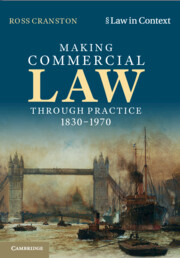
-
Select format
-
- Publisher:
- Cambridge University Press
- Publication date:
- May 2021
- May 2021
- ISBN:
- 9781108182836
- 9781107198890
- 9781316648377
- Dimensions:
- (247 x 174 mm)
- Weight & Pages:
- 1.7kg, 528 Pages
- Dimensions:
- (244 x 170 mm)
- Weight & Pages:
- 0.898kg, 528 Pages
- Subjects:
- Law: General Interest, Legal History, Law, History, Economic History, Jurisprudence
- Series:
- Law in Context
You may already have access via personal or institutional login- Subjects:
- Law: General Interest, Legal History, Law, History, Economic History, Jurisprudence
- Series:
- Law in Context
Book description
Making Commercial Law Through Practice 1830–1970 adds a new dimension to the history of Britain's commerce, trade manufacturing and financial services, by showing how they have operated in law over the last one hundred and forty years. In the main law and lawyers were not the driving force; regulation was largely absent; and judges tended to accommodate commercial needs, so that market actors were able to shape the law through their practices. Using legal and historical scholarship, the author draws on archival sources previously unexploited for the study of commercial practice and the law's role in it. This book will stimulate parallel research in other subject areas of law. Modern commercial lawyers will learn a great deal about the current law from the story of its evolution, and economic and business historians will see how the world of commerce and trade operated in a legal context.
Reviews
‘The author has drawn on an impressive range of source material-the detailed footnotes to the text refer to contemporary accounts of commercial practice, economic and historical studies, business and banking archives, law reports of the period, and a number of victorian literary extracts whose charecters convey the sentiments of the time. This is undoubtedly an important work.’
Nikki Singla Source: Counsel Magazine
‘… superb volume … It is impossible within the compass of this review to do justice to the wealth of learning and historical data contained in this superb work. It is not only legal historians but all those interested in the evolution of commercial law who will derive both profit and pleasure from reading it.’
Professor Sir Roy Goode Source: Journal of International Banking and Financial Law
‘… a work of impressive scholarship, drawing on many original sources including business and bank archives … [It] is not only of great historical interest. It is a timely reminder that English commercial law needs constantly to adapt to the changing needs of commerce.’
George Leggatt Source: Law Quarterly Review
‘Ross Cranston’s fine study sheds new light on how English commercial law has been made. The analysis presented is a humbling one for commercial lawyers and judges. What emerges is how much commercial law was established by the market participants, with little involvement of lawyers, and still less of the courts or the state. The particular contribution of the book is Professor Cranston’s illumination of the role of non-state institutions and organizations in such ‘private law-making’. Drawing on an impressive range of sources, he explores the essential role played in the process by the commodity exchanges, trade associations, auctioneers and clearing houses of nineteenth-and earlyt wentieth-century Britain.’
Christopher Butcher - The Journal of Legal History
‘The first main point of interest in Making Commercial Law is the detailed analysis of how English law and English courts shaped the normative environment within which markets expanded, in England and in a large part of the world … the first introductory chapter (pp. 1–60) should be a must-read for any historian with even a passing interest in the operations of nineteenth-century markets or in the way the Common Law shaped those markets - and not as a dummy variable.’
Jérôme Sgard - The Journal of Economic History
‘… an ambitious, dense book that is obviously the culmination of a lifetime of scholarship and research. Cranston knows and references the secondary literature and the judicial decisions, but it is his use of archival material that is truly exciting. Trade association and company directors’ minute books, solicitors’ opinions, standard form contracts, contract books, agency agreements, and more provide an in-depth and on-the-ground view.’
Emily Kadens Source: Rechtsgeschichte – Legal History
‘One of the great strengths of this study as a whole is that it approaches the subjects considered from the bottom up. While there is a rich depth and array of secondary scholarship presented, the study is primarily based upon archival materials with reference to the (largely published) accounts of contemporaries involved in these transactions. The author’s conclusions are thus original and provide novel insights into law and the economy. It is an important work for the lawyers of today …’
Catharine MacMillan Source: Legal Studies
Contents
Metrics
Altmetric attention score
Full text views
Full text views help Loading metrics...
Loading metrics...
* Views captured on Cambridge Core between #date#. This data will be updated every 24 hours.
Usage data cannot currently be displayed.
Accessibility standard: Unknown
Why this information is here
This section outlines the accessibility features of this content - including support for screen readers, full keyboard navigation and high-contrast display options. This may not be relevant for you.
Accessibility Information
Accessibility compliance for the PDF of this book is currently unknown and may be updated in the future.


